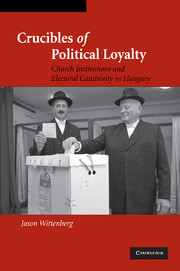Book contents
- Frontmatter
- Contents
- List of Figures
- List of Tables
- Acknowledgments
- INTRODUCTION
- 1 EXPLAINING POLITICAL PERSISTENCE
- 2 ELECTORAL PERSISTENCE AND VOLATILITY IN HUNGARY
- 3 THE CHURCHES FIRST CONFRONT COMMUNISM
- 4 THE BATTLE FOR SOULS, 1948–1956
- 5 THE BATTLE FOR SOULS AFTER 1956
- 6 CHURCH COMMUNITY AND RIGHTIST PERSISTENCE: STATISTICAL EVIDENCE
- 7 CONCLUSION
- Appendices
- Bibliography
- Index
- Titles in the series
INTRODUCTION
Published online by Cambridge University Press: 02 September 2009
- Frontmatter
- Contents
- List of Figures
- List of Tables
- Acknowledgments
- INTRODUCTION
- 1 EXPLAINING POLITICAL PERSISTENCE
- 2 ELECTORAL PERSISTENCE AND VOLATILITY IN HUNGARY
- 3 THE CHURCHES FIRST CONFRONT COMMUNISM
- 4 THE BATTLE FOR SOULS, 1948–1956
- 5 THE BATTLE FOR SOULS AFTER 1956
- 6 CHURCH COMMUNITY AND RIGHTIST PERSISTENCE: STATISTICAL EVIDENCE
- 7 CONCLUSION
- Appendices
- Bibliography
- Index
- Titles in the series
Summary
The Paradox of Political Persistence
One of the oldest paradoxes in the study of politics is why mass political loyalties persist long after the circumstances around which they arose have disappeared. This paradox has emerged in a variety of different forms across a wide range of countries and time periods, and has puzzled not just political scientists, but historians, sociologists, anthropologists, and many other observers of political life. Indeed, despite nearly a century of empirical research and theoretical development, we still do not fully understand why certain regions exhibit remarkable political stability even through dramatic and prolonged social upheaval. This book will show how to recognize, analyze, and explain political continuity by examining some particularly puzzling instances of it.
Perhaps the most remarkable example of persistence has occurred in France, where, at least since Siegfried (1913), scholars have attempted to decode the extraordinary longevity of political divisions that originated in much earlier periods of history. The French Revolution gave birth to our modern notions of “Left” and “Right” in politics, and these labels have continued to define French politics ever since. Since at least the middle of the nineteenth century, for example, large swathes of western France have consistently supported the Right, while parts of Mediterranean France have supported the Left. This has remained true even through changes in political regime, wars, in- and out-migration, disruptive economic development, and dramatic organizational discontinuity in the political parties that have represented both the Left and the Right.
- Type
- Chapter
- Information
- Crucibles of Political LoyaltyChurch Institutions and Electoral Continuity in Hungary, pp. 1 - 19Publisher: Cambridge University PressPrint publication year: 2006



